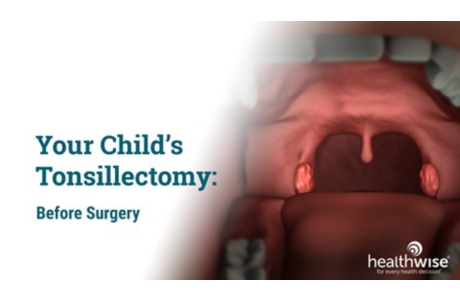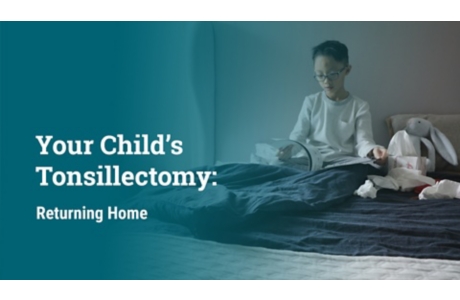Tonsillectomy
Surgery Overview
A tonsillectomy is surgery to remove the tonsils. The adenoids may or may not be removed at the same time. This topic is about surgery to remove the tonsils, not the adenoids.
For children, a general anesthetic is always used. It makes the child sleep during the surgery. Adults may need only a local anesthetic to numb the throat.
What To Expect
Tonsillectomy is often done as an outpatient surgery. But some people may need to stay overnight in the hospital.
A person can expect to have a very sore throat after surgery. It may last for several days. This may affect the sound and volume of the voice. It can make it harder to eat and drink. The person may also have bad breath for a few days after surgery. There is a very small risk of serious bleeding after surgery.
A child who has a tonsillectomy may not feel well for a week to 10 days. But if the child is feeling well after the first few days, there is no need to restrict his or her activity or to keep the child at home.
Why It Is Done
A tonsillectomy may be done when:
- A person has tonsillitis that does not get better or that comes back often.
- A person has strep throat that keeps coming back within 1 year even with antibiotic treatment.
- Abscesses of the tonsils do not get better after they are drained. Or the person has an abscess along with other signs that point to a tonsillectomy.
- A foul odor or taste in the mouth is caused by tonsillitis, and it does not get better with antibiotics.
- A biopsy is needed to check for a suspected tumor of the tonsil.
- The tonsils are so large that they affect nighttime breathing. This is called sleep apnea. This most often affects children.
Large tonsils are not a reason to have a tonsillectomy unless they are causing one of the above problems or they are blocking the upper airway. This blockage may cause sleep apnea or problems with eating.
How Well It Works
Children who have their tonsils removed for repeated throat infections may have fewer and less severe strep throat infections for at least 2 years. But over time, many children who do not have surgery also have fewer throat infections.footnote 1
Adults who have their tonsils removed after repeated strep throat infections don’t get as many new infections as adults who do not have the surgery. And adults who had the surgery also don’t get sore throats as often.footnote 2
Risks
Some bleeding is a normal risk after a tonsillectomy. This is common, especially when the healed scab over the cut area falls off.
Less common or rare risks include:
- Breathing problems from surgery.
- More serious bleeding.
- Problems from anesthesia.
- Death after surgery. (This is very rare.)
What To Think About
When you are trying to decide whether to have a child’s tonsils removed, you might want to think about:
- How much time the child is missing from school because of throat infections.
- How much the illness stresses and poses problems for the family.
For children and adults, the risks of surgery must also be weighed against the risks of leaving the tonsils in. In some cases where strep throat keeps coming back, surgery may be the best choice. This is especially true if there are also other problems from the tonsils.
Some people think that removing the tonsils may hurt the body’s immune system, but research does not support this.
References
Citations
- Georgalas CC, et al. (2014). Tonsillitis. BMJ Clinical Evidence. http://clinicalevidence.bmj.com/x/systematic-review/0503/overview.html. Accessed April 14, 2016.
- Alho OP, et al. (2007). Tonsillectomy versus watchful waiting in recurrent streptococcal pharyngitis in adults: Randomised controlled trial. BMJ. Published online March 8, 2007 (doi: 10.1136/bmj.39140.632604.55).
Credits
Current as of: October 21, 2018
Author: Healthwise Staff
Medical Review:Adam Husney, MD – Family Medicine & Kathleen Romito, MD – Family Medicine & Charles M. Myer III, MD – Pediatrics, Otolaryngology
Current as of: October 21, 2018
Author: Healthwise Staff
Medical Review:Adam Husney, MD – Family Medicine & Kathleen Romito, MD – Family Medicine & Charles M. Myer III, MD – Pediatrics, Otolaryngology
This information does not replace the advice of a doctor. Healthwise, Incorporated, disclaims any warranty or liability for your use of this information. Your use of this information means that you agree to the Terms of Use. Learn how we develop our content.




